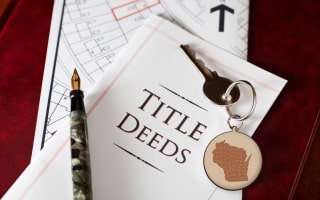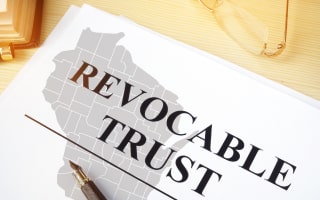How to Find Owners of Properties
in Wisconsin

There are numerous Wisconsin property laws and statutes that regulate property ownership. For example, Chapter 700 defines the types of ownership that are allowed in the state. Chapter 706 goes into further detail about conveying real estate.
When a piece of property is sold or transferred, the details of the transaction must be recorded in a registry of deeds. The Wisconsin property laws that govern records and their availability to the public are detailed in Chapter 59.43.
Wisconsin real estate can be owned by individuals, partnerships, or legal entities. The types of entities that can own property include limited liability corporations (LLCs) and trusts. If you need to find the name of someone who owns real estate, consider accessing and reviewing ownership records. Identifying ownership is simple when the property is held by an individual. On the other hand, it can be much more complicated when the property is controlled by a corporation, LLC, or trust.
How Do You Find Owners of a Property in Wisconsin?

While it can take some time to find the owner of a property in Wisconsin, there are several methods you can use to gain access to this information, such as public documents.
Registry of Deeds
The Wisconsin Registry of Deeds is a database that houses every recorded document on a piece of property. If the document was drafted when establishing property ownership, it will be stored in a registry of deeds. Every county in Wisconsin has a registry of deeds where these documents are recorded.
When you access a deed, you can learn about any encumbrances, liens, or mortgages associated with the property. You may also find information about real estate contracts and property taxes. To search these records, you'll need to provide the property address, owner's name, or parcel ID. Some of the counties that provide the public with online property databases include the following:
- Milwaukee County
- Dane County
- Waukesha County
- Brown County
- Racine County
- Outagamie County
- Winnebago County
Land Records Website
When a property is first sold to an investor or buyer, a land record will be created. These records can consist of deeds, mortgages, and wills. Most of the counties in Wisconsin that offer property search databases allow the public to access land records. You'll need to provide the same information that's needed to search the Wisconsin Registry of Deeds, which includes the property address, parcel number, or name of the owner.
City or Town Assessor's Office
Every city in Wisconsin has an assessor that estimates property values and stores records related to each home and building in their jurisdiction. Assessors are tasked with identifying current property values for taxation purposes.
To make the necessary estimates, assessors must maintain and review property assessment records, tax documents, and sales records. You can either visit the assessor's office or access the online database when you want to search for these records. The links for the following cities take you to the local assessor's website:
Tax Records
Property tax records are some of the documents that are stored and updated by your local assessor. These records will include information about the property's tax history, assessed values, and ownership. If you wish to request these records, you'll need to perform a search on the assessor's website or visit their office.
Title Company/Agency
Title companies conduct extensive searches to make sure that properties are free of liens and encumbrances. The type of search they perform verifies that the seller has the right to transfer the property to a buyer. They have access to comprehensive databases that contain property records and other important documents. For example, a Wisconsin title company can review mortgage documents and deeds during a standard search. In Wisconsin, you can pay anywhere from $90-$200 to obtain a title search.
There are several other methods you can employ to determine who owns a specific property. For example, consider speaking with the neighbors to see if they'll tell you anything about the current owner. You can also browse real estate websites to find this information. If you aren't having any luck, ask a local real estate agent or lawyer.
![]() Commercial Services
Commercial Services
Third-party real estate websites like PropertyChecker.com give you the tools necessary to find ownership information on practically any piece of real estate in Wisconsin. While these records aren't as exhaustive as the official ones, they should include the names of current and past owners.
After you navigate to the website, look for the search box at the top of the page. If you know the owner's name, address, or parcel ID, you should be able to find documents related to the property. The types of records that will be made available to you include the following:
- Property tax records
- Foreclosure information
- Building permit details
- Lien records
- Deed records
- Property details
- Market and assessed values
- Information about the neighborhood
- Loan records
- Previous sales history
- Owner names
What Are the Different Types of Property Ownership in Wisconsin?

Property ownership can take many forms in Wisconsin. While sole ownership is more common than other types, property can be owned by spouses, families, or business entities. Several people can create a limited liability company (LLC) that's designed specifically to hold real estate. If you're looking to buy real estate, understanding the various types of ownership should help you find the solution that meets your needs.
Making the right choice can influence everything from your risk to the financing you have access to. Every ownership type has legal and financial implications that you should know of before you start a transaction. The most common types of ownership include tenancy in common, sole ownership, and joint tenancy. In the following guide, you'll learn more about each ownership title, including its implications and advantages.
-
Sole Ownership: One person has the right to use the property they acquire. Total control over what happens to the property. Full liability for the taxes and debts that are tied to the property.
-
Joint Tenancy: At least two people obtain equal shares of the home and have the right of survivorship. Property doesn't need to pass through probate to transfer shares after death. Joint tenancy comes to an end if an owner sells or transfers their interest.
-
Tenants by Entirety: Married couples often request this type of joint tenancy. Main benefits include survivorship rights and protection from creditors. All property decisions must be mutually agreed to.
-
Community Property: A type of property that's purchased by both spouses during their marriage. Each spouse possesses the same rights to use and manage the property. The property must be equally divided after a divorce.
-
Tenancy in Common: Multiple owners hold unequal or equal shares of a home. One owner can independently sell their shares or place them in an inheritance. Owners might disagree over Wisconsin property transfer or management decisions.
-
Condominium Ownership: Individuals purchase units in complexes. Access to amenities, shared common areas, and personal living space. In most cases, HOA rules and expenses apply.
-
Cooperative Ownership: Residents have collective ownership of the property. Initial purchase costs are low for every member. An individual can only sell shares if they receive approval from the other members.
-
Trust Ownership: A home is placed and held in a trust for its beneficiaries. Protects assets and offers other tax advantages. The structure of a trust makes it difficult to manage or sell the property.
-
Life Estate: Ownership of the home remains in place until the person dies. The person can use the property and benefit from it while they are alive. The remainderman must concur with the transfer or sale of the property.
Finding the Owner of a Trust or Corporation that Owns Properties in Wisconsin

Wisconsin real estate can be owned by the following entities:
- Individual
- Partnership
- Limited liability company
- C or S corporation
- Trust
You can obtain assistance from a real estate attorney or Wisconsin title company if you're interested in finding the owner of a corporation or trust in Wisconsin. When you try to find this data without the help of a professional, you may need to take several steps to identify the names of the current owners.
For example, you could search business databases like LexisNexis or Westlaw. You can also visit your local chamber of commerce to request the documents you need. Consider cross-referencing mortgages, property tax documents, deeds, and other public records to find the info.
Finding the Owner of a Trust in Wisconsin
Identifying the person who owns a trust can be difficult in Wisconsin. This is the one form of ownership that doesn't need to be directly recorded. Only the beneficiaries of a trust may be allowed to view the document that created the account. However, a real estate lawyer might help you gain access to this information.
Finding the Owner of an LLC in Wisconsin
When you're searching for the owner of an LLC in Wisconsin, start by performing a business entity search online. This tool is available on the government's website as part of the Department of Financial Institutions.
Once you enter the name of the company, you'll be able to find the owner as well as other information about the entity. You can also perform an advanced search to shorten the list of results.
Finding the Owner of a Corporation in Wisconsin
To find the owner of a corporation in Wisconsin, you can use the Department of Financial Institutions search tool. This tool gives you access to the state's comprehensive company database. The records you receive should contain everything from the entity type to its current status.
Common Methods of Property Transfer in Wisconsin

Property deeds are documents that are drafted and signed when transferring or selling real estate in Wisconsin. These documents include the details of the transfer as well as any rights or privileges that the buyer has. Both parties must agree to the terms of the deed for it to be recorded. While Wisconsin residents have access to everything from grant deeds to mortgage deeds, the most common types are detailed below.
-
General Warranty Deed: A general warranty deed is the best and most common option in real estate transactions. It protects the buyer from any ownership claim. This deed also guarantees that the current owner is legally able to transfer the property. The buyer can be confident that there aren't any liens on the property if they receive this deed.
-
Special Warranty Deed: This deed has a more limited scope than a general warranty one. While a special warranty deed protects against encumbrances or problems that occurred during the current ownership, it doesn't cover the property's entire history.
-
Quitclaim Deed: This type of deed doesn't provide the buyer or recipient with any protection, which is why it's mainly used when transferring real estate to a family member or friend. If someone else claims that they have ownership rights after the transfer takes place, the new owner must handle the issue without help from the previous title holder.
Step-by-Step Guide to Property Transfer in Wisconsin

Buying or selling a property requires knowledge of what this process entails. Numerous administrative and legal steps occur when conveying a property title. In Wisconsin, the steps in this process depend on the type of Wisconsin property transfer you wish to use. If you're gifting the property to someone else, the transfer might not be as complicated. The other transfer types include sale, divorce, and business transfer.
You'll then need to obtain a title search to identify any liens or disputes about the current title. Lenders often require buyers to purchase title insurance, which protects against unexpected issues.
If the title is clear, the deed can be drafted. This document is used to transfer the property from the current owner to the new one. A notary public must witness both parties signing the deed.
Make sure you pay the necessary property transfer taxes as well. In Wisconsin, these taxes are $3 per $1,000 of the final sale price. Once the deed is recorded with the county, make sure you update your local assessor. You'll also be expected to pay recording fees, which amount to $30 per document.
Property Ownership Guide
- How to Find Owners of Properties in Wisconsin
- How Do You Find Owners of a Property in Wisconsin?
- What Are the Different Types of Property Ownership in Wisconsin?
- Finding the Owner of a Trust or Corporation that Owns Properties in Wisconsin
- Common Methods of Property Transfer in Wisconsin
- Step-by-Step Guide to Property Transfer in Wisconsin
Wisconsin Homeowner Lookup
- Owner(s)
- Deed Records
- Loans & Liens
- Values
- Taxes
- Building Permits
- Purchase History
- Property Details
- And More!
Property Ownership Guide
- How to Find Owners of Properties in Wisconsin
- How Do You Find Owners of a Property in Wisconsin?
- What Are the Different Types of Property Ownership in Wisconsin?
- Finding the Owner of a Trust or Corporation that Owns Properties in Wisconsin
- Common Methods of Property Transfer in Wisconsin
- Step-by-Step Guide to Property Transfer in Wisconsin